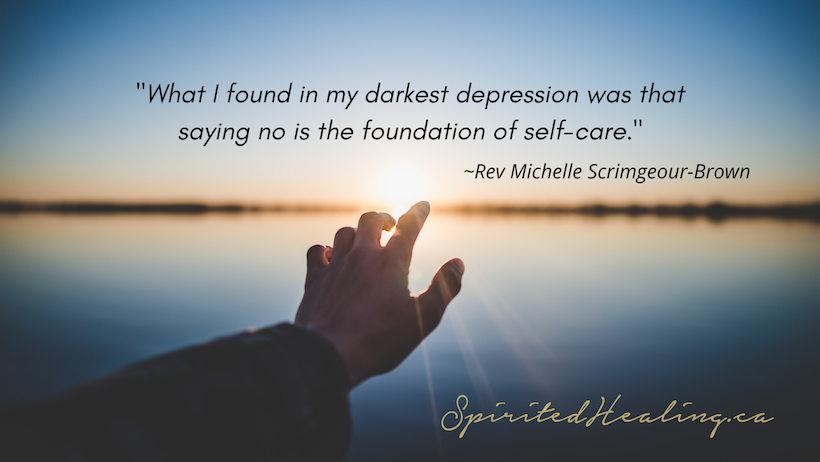A friend in my newsfeed asked people to share with her their self-care practices. She got the answers that you would expect: exercise, meditation, journaling, and so on. While I agree with these answers, as I read them over I realized something important.
When I was in my darkest depression about 10 years ago now, a lot of people told me to do those things. “You’ll feel so much better if you take 20 minutes to yourself.” While this was true – 20 minutes really is a magic number for me — I was home all day with a 6-year-old and a 2-year-old, and my husband was commuting over an hour each way for work every day. Where was I going to find 20 minutes?
Every time I received this advice, I felt shame.
I was ashamed because I couldn’t figure out how to find another 20 minutes in my day. I was awake for an average of 15 hours a day, 10 of which I was the on-deck parent for a very busy 2-year-old, and my school-attending 6-year-old. I was making 3 meals a day for the family, and endless snacks for the kids; I was prioritizing my relationship with my husband so we could keep our spark alive, and frankly I was exhausted. This is without listing all the playdates, doctors’ and dentists’ appointments and the usual tasks that keep a home running smoothly.
I felt ashamed because I couldn’t convince myself to get up 20 minutes earlier so I could meditate or exercise or journal; and I couldn’t stay up 20 minutes later because I was so damn tired! I was ashamed because the times I tried to meditate either in the early morning or at the end of the day I would fall asleep. And then the shame started to tell me I knew I wasn’t worth my time, that I was committed to being less than… I was failing. I wasn’t good enough.
Can you relate?
This is less of a problem for me now because I figured out the very first step on the path of self-care: BOUNDARIES. I know that sounds like a big (maybe even scary) word. For a person like me, who developed an intense people-pleasing habit in response to childhood trauma, I couldn’t really understand what boundaries were. I read about them and understood that boundaries were supposed to keep me safe. “But,” I thought, “that’s what all of these habits I already have do, don’t they?”
You see, when you experience trauma your brain helps to keep you safe by developing new patterns and habits that might protect you from a repeat of that trauma. I grew up with a violent father. My brain counselled me to make sure everyone was happy so we could all stay safe. If I took care of my siblings, they wouldn’t upset him and cause a horrific tirade. If I got supper cooked just right, he wouldn’t tell me all the things that were wrong with it; he wouldn’t take it out on my mother. If I didn’t tell anyone about what had happened to me, then they couldn’t get mad at me and we’d be safe. If I did everything just right, then we would all be safe.
This is how the people-pleasing habits started in me. People-pleasing was a life-saving habit. When I started to think about boundaries, I had to face that I really only had one boundary, and that was “How can I be safe?” Once I looked at that boundary, I realized the truth was what I once thought kept me safe, now kept me trapped.
Trapped, because I no longer lived in that violence. The habit, however, had me on guard, always waiting for the violence to return. Trapped, because I had learned that love was transactional and so I couldn’t receive the love my partner was offering me in our marriage. Trapped, because I believed I was the only one who could protect me. Trapped because what I thought about my life was out of alignment with my reality.
The reality was, my home life was safe. My children were safe. My husband was gentle. These were fundamental truths. Recognizing this meant that I could let go of my need to control every moment of every day. I could let go of the “correct” way to behave or respond. I could relax a little in my vigilance.
I could start to say no.
What I found in my darkest depression was that saying no is the foundation of self-care. It is the very first boundary. It is the single most important step.
“No, I can’t help you with that. It sounds like fun though, enjoy yourself!”
“No, I’m busy at that time. Thank you for thinking of me!”
“No, you can do that yourself.”
“No, I don’t want to.”
“No.”
As soon as I started saying no, as soon as I started letting the people around me do the things they were capable of doing themselves, I had 20 minutes to focus on me. I had an hour, even! And I learned, too, that even when I have lots of time journaling still isn’t my thing.
But self-care? Well. Self-care is everything.


Recent Comments